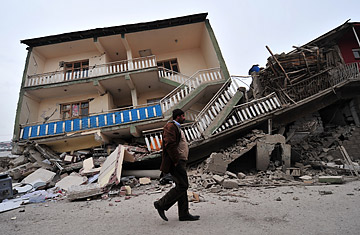
A man walks past a collapsed building in Ercis, Turkey, after a 7.2-magnitude earthquake struck the region.
Fact 1: Turkey is earthquake prone. Sitting on the intersection of the Eurasian, African and Arabian tectonic plates, it is crisscrossed by active fault lines. Fact 2: The death toll and devastation caused by an earthquake is determined in no small part by a country's building codes. Turks learnt that the hard way in 1999, when a massive quake in the country's west killed 20,000 people, mostly as a result of the collapse of poorly constructed high-rise buildings that had mushroomed during the '80s and '90s. Back then, anyone sifting through the debris of destroyed apartments along the coast would have spotted the seashells and beach sand mixed in with the concrete — a cost-cutting shortcut that proved fatal.
Twelve years on, there is a wearying sense of déjà vu to the scale of destruction left by the 7.2 quake that struck the eastern city of Van on Sunday. "You don't need to be an expert to understand what happened in Van," wrote Sedat Ergin after surveying the scene. "There is a shocking contradiction. Most buildings are intact, yet some have folded like a pack of cards. Others had to be evacuated because of cracks and internal damages." Nearly 500 people are confirmed dead and 2,000 structures destroyed, including about 80 multi-storey buildings.
"It grieves me to say that Turkey hasn't progressed more than an inch since 1999," says Mehmet Sogancz, head of the Chamber of Engineers and Architects (TMMOB) on his way back from a fact-finding trip to Van.
Concrete thinned with gravel, insufficient steel girders and supports knocked out to create more space are just some of the causes cited by observers — including Prime Minister Recep Tayyip Erdogan — for the devastation in Van. "When we look at the wreckage, we see how the material used is of bad quality," Erdogan said Wednesday. "We see that people pay the price for concrete that virtually turned to sand, or for weakened concrete blocks on the ground floors. Municipalities, constructors and supervisors should now see that their negligence amounts to murder."
Some 98 percent of Turkey sits on or near a major faultline, including the cultural and financial capital Istanbul, home to 15 million people. The building code was updated in 2001 to enforce strict new standards, but that didn't address the challenge of what to do about housing stock built before then. Thirty percent of Turkey's existing buildings require strengthening, while 10 percent are unfit for use, according to the TMMOB. All are required to be insured in mandatory government-backed Turkish Catastrophe Insurance Pool, established in 2000 with the support of the World Bank. But the fund has insured only about 26 percent of homes and in Van, just 7 percent.
"All of the multi-storey buildings destroyed in Van date back to before 2002. This is a fundamental problem," says Soganci. "Look at how Japan rebuilt everything after the Kobe earthquake, it can be done. But it requires focused public policy, there's no other way. The cost of rehabilitating the 30 percent weak building stock is nothing compared to the cost of damage from an earthquake."
A second problem is lax enforcement. The new building code, for example, initially took effect in 11 pilot provinces. The remaining 70 provinces —including Van — were only included at the start of this year.
A parliamentary report last year concluded authorities were failing to enforce new building codes, which require that all construction be based on plans prepared by authorized architects and construction engineers, and are approved by inspectors. "Enforcement shouldn't just be about the final structure. It is a process that needs to take into account all the stages of construction, from choosing a site to taking into account its ultimate use," the report said.
Additionally, TMMOB's Soganci says, handing inspection of building standards over to private companies is a mistake. "This should be publicly regulated. Otherwise it becomes about the monetary relationship between contractors and regulatory firms that is open to misuse."
Turkey's lessons from Van could matter internationally as well. There are any number of sprawling developing cities worldwide that facing similar challenges — Lima, Tehran and Karachi, to name a few — where rapid and uncontrolled urban development has eclipsed housing safety standards, making Van unlikely to be the last such tragedy.
